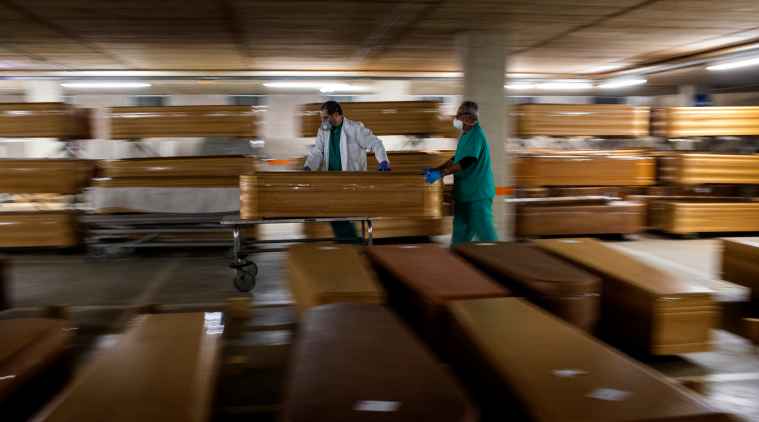 “In May, 226 bodies were brought here. Before this pandemic struck, we used to receive these many bodies in a year. At most, 30 bodies would arrive in a month before the outbreak,” said an employee at the Worli crematorium. (Representational)
“In May, 226 bodies were brought here. Before this pandemic struck, we used to receive these many bodies in a year. At most, 30 bodies would arrive in a month before the outbreak,” said an employee at the Worli crematorium. (Representational)
As of Friday, 1,173 people had died due to Covid-19 in Mumbai. Amid the pandemic, while the city’s 11 electric crematoria have been functioning at double their capacity, the backlog of the departed awaiting final rites has led to many grief-struck families queuing up for cremation, with some even waiting for seven to 10 hours.
An employee at the Worli crematorium said, “In May, 226 bodies were brought here. Before this pandemic struck, we used to receive these many bodies in a year. At most, 30 bodies would arrive in a month before the outbreak.” In all, Mumbai has 49 BMC-run and 20 private crematoria.
Family members of a 55-year-old deceased man had to wait for about 12 hours to cremate his body at Daulat Nagar crematorium in Borivali. The resident of Appa Pada slum in Malad (East) had died on May 25 at Shatabadi hospital, awaiting Covid-19 test result.
“The body was released as a suspected case of Covid-19 death. Later in the night, the body was first taken to Vadarpada crematorium near Lokhandwala, Kandivali. But they said they are only cremating Covid-19 patients. We then visited Daulat Nagar crematorium, where we were informed we would have to wait till around 6.30 am the next day,” said Prem Vishvakarma, a friend of the deceased.
Besides the waiting period, another problem the families have to face is arranging for ambulances. As the bodies have to be directly shifted from ambulances to the furnaces at the crematorium, the ambulances are like makeshift mortuaries. “At midnight, we arranged for a second ambulance, as the ambulance in which the body was brought had to attend to another patient. After speaking to two ambulance services, which were charging Rs 1,000 advance and Rs 300 per hour, finally we one agreed to take us to the crematorium at Rs 3,500 and wait there till the morning,” Vishwakarma said.
For the last 10 days, electric crematoria at Shivaji Park in Dadar, Chandanwadi in Kalbadevi and Worli are working at half their capacity, as one furnace at each of the facilities has been shut down for repairs. A furnace at the Worli crematorium is under repair after a fire last week.
A staffer from a crematorium in south Mumbai said that the machines are currently bearing the load of a year in a month. “The bodies are wrapped in a plastic body suit and sanitised. Due to this, the temperature in the furnace rises suddenly as opposed to cremations of non-Covid-19 patients. This is the reason behind fires at the furnaces.”
A staffer from Worli crematorium said, “Due to the lockdown, the availability of wood required in wood-based cremation is low… We also get non-Covid-19 bodies, increasing the load on the furnace.”
Congress corporator from Bandra West, Asif Zakaria, said similar cases of delay are being reported from across the city. He said the BMC should start an online mechanism where real-time updates of crematoria can be seen.
BMC officials said the delay is also caused by the disinfection protocol that has to be followed after cremation. “The furnace is a machine and we have to follow a maintenance protocol. Once a body is placed in the furnace, the process takes about one-and-a-half hours. Then the furnace has to be cleared and the temperature should come down to negative before the next body is brought in. Also, the staffers have to change their PPE,” said an official.
Some crematoria have now started giving token numbers to family members while asking them to wait at the hospital till their turn comes.
Bhoiwada Crematorium has been one of the busiest as it has KEM hospital, Tata hospital and TB Hospital in its vicinity. Local Shiv Sena corporator Sachin Padwal, with the help of KEM hospital administration, has set up a mechanism under which relatives of patients are being given such token numbers. “The body is being kept at KEM hospital. After the crematorium staff alerts us, we call the family members to take the mortal remains to the crematorium,” said Padwal.
The BMC, meanwhile, has issued a short tender for setting up 15 temporary mortuaries inside Hindu electric crematoria. The temporary or mobile mortuaries are like boxes where bodies can be kept till their turn for last rites comes. With this, BMC aims to reduce the waiting period and also the risk to relatives as well as the staffers of crematorium who have to wait with the bodies in ambulances.
According to the infection control protocol, all Covid-19 bodies either have to be cremated in electric crematoria or buried at burial grounds that are large enough to ensure the infection would not spread.